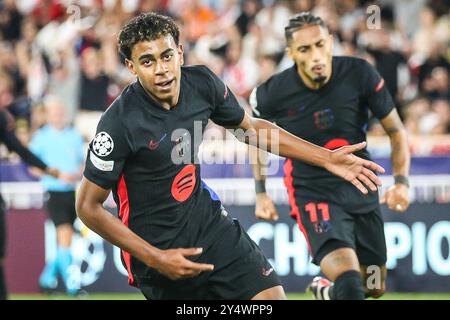In the high-stakes arena of the UEFA Champions League, FC Barcelona demonstrated their resilience and tactical prowess in a hard-fought victory over their formidable opponents. Central to this triumph was the Brazilian winger Raphinha, whose decisive goal not only secured the win but also underscored his growing influence within the squad.
The match unfolded with a blend of tension and excitement, as Barcelona sought to assert their dominance early on. Despite grappling with a spate of injuries that had stripped them of key players, the Catalan giants showcased their depth and tactical acumen. Central to their approach was their ability to control the tempo of the game, maintaining possession with precision and patience—hallmarks of Barça's traditional style.
Raphinha, whose transfer from Leeds United had been met with both anticipation and skepticism, has gradually carved a niche for himself at the Camp Nou. His performance in this Champions League fixture was a testament to his technical skills and his ability to deliver under pressure. Positioned on the right flank, Raphinha was a constant threat, utilizing his pace and dribbling prowess to unsettle the opposition's defense.
The breakthrough came in the 27th minute when Raphinha latched onto a perfectly weighted through ball from Pedri. Demonstrating composure beyond his years, he slotted the ball past the advancing goalkeeper with a deft touch, sparking celebrations amongst the Barcelona faithful. This goal not only put Barcelona ahead but also exemplified Raphinha's knack for finding crucial spaces and his sharp finishing skills.

As the match progressed, Barcelona's defensive solidity was put to the test. The opposition, eager to claw back into the contest, pressed high and sought to exploit any gaps in the Catalan defense. Yet, the backline, marshaled by the experience of Marc-André ter Stegen, stood firm. The German goalkeeper's command over his area and his distribution skills played a pivotal role in launching counter-attacks, often involving Raphinha, who was eager to exploit the spaces left by the opposition's forward surges.
Tactically, manager Xavi Hernandez's approach was noteworthy. Opting for a fluid 4-3-3 formation, Xavi ensured that Barcelona's midfield trio could dominate possession and transition swiftly from defense to attack. The central midfielders, Gavi and Frenkie de Jong, orchestrated play with an impressive array of passes, effectively supporting both the defense and the forward line.
Despite the victory, the match was not without its challenges. Barcelona's injury list has been a mounting concern, with key players sidelined, forcing Xavi to rely on young talents and fringe players to step up. This scenario, however, has unveiled the depth of Barcelona's squad, as the likes of Lamine Yamal have taken the opportunity to shine on the grand stage.

This victory propels FC Barcelona to a stronger position in their Champions League group, enhancing their prospects of progressing to the knockout stages. It also serves as a morale booster, reinforcing the belief within the squad that they can contend with Europe's elite, despite the ongoing injury-induced adversities.
Looking ahead, the challenge for Xavi and his team will be to maintain this momentum. With fixtures coming thick and fast, the management of player fitness and tactical rotations will be crucial. Raphinha's form will undoubtedly be central to Barcelona's ambitions, as his ability to influence games with goals and assists makes him an invaluable asset.
The path ahead in the Champions League remains fraught with challenges, but with players like Raphinha stepping up, FC Barcelona's aspirations of reclaiming European glory appear increasingly tangible. As the tournament progresses, fans and analysts alike will be keenly observing whether this victory marks the beginning of a resurgence for the Catalan club on the continental stage.